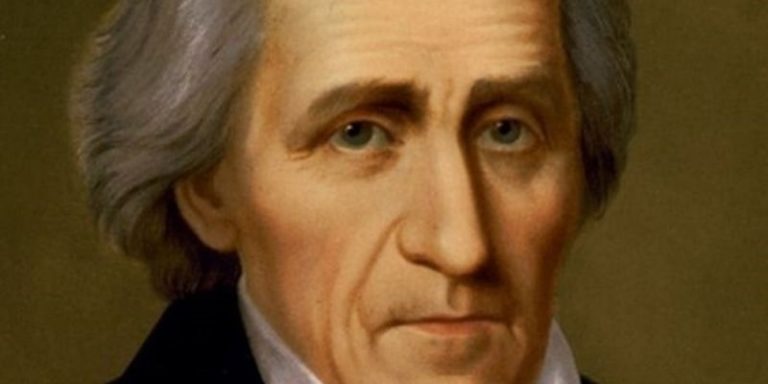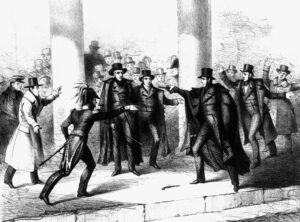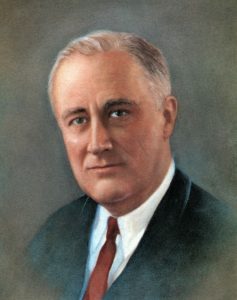This Week in History: January 30 – February 5
President Jackson survives an assassination attempt and the 15th and 16th Amendments are ratified.
By: Kelli Ballard | January 30, 2022 | 680 Words

Andrew Jackson (Photo by: Photo12/Universal Images Group via Getty Images)
“The past is malleable and flexible, changing as our recollection interprets and re-explains what has happened.” ~ Peter L. Berger
January 30 – February 5
January 30, 1835: President Jackson Survives Assassination Attempt
Andrew Jackson, the seventh U.S. president, was the first commander-in-chief to experience an assassination attempt. The president was leaving from a congressional funeral when Richard Lawrence, who had been hiding behind a pillar at the entrance to the Capitol Rotunda, stepped out and aimed a derringer single-shot pistol at his heart.

Richard Lawrence attempted to assassinate President Andrew Jackson as he was leaving the Captiol as part of the funeral procession of Warren R. Davis. (Photo by © CORBIS/Corbis via Getty Images)
The gun went off, but the powder didn’t ignite – in other words, the gun misfired. Jackson, whose health had been deteriorating, was using a cane to assist in walking. The president used the cane to attack his would-be assassin, but not before Lawrence was able to get off another shot with a second pistol. This, too, luckily misfired.
Lawrence was an unemployed house painter who was likely mentally unstable. Jackson was convinced he had been hired by the Whig Party, but that was never proven. Lawrence spent the rest of his life in a psychiatric hospital. Amazingly, 100 years later, Smithsonian Institute researchers tested his pistols – both guns fired properly. The odds of both guns misfiring, as they had during the assassination attempt on Jackson, were one in 125,000.
February 3, 1870: The 15th Amendment Ratified
“The right of citizens of the United States to vote shall not be denied or abridged by the United States or by any State on account of race, color, or previous condition of servitude.”
The 15th Amendment was designed to protect the voting rights of black Americans after the Civil War ended. However, it took the Voting Rights Act of 1965 to fully protect those rights.

February 3, 1913: The 16th Amendment Ratified
“The Congress shall have power to lay and collect taxes on incomes, from whatever source derived, without apportionment among the several States, and without regard to any census or enumeration.”
The 16th Amendment gave the government power to impose an income tax on citizens. Some representatives argued that this should only be done to raise revenue during times of war, while others said it was necessary to support the federal government. It has become the government’s largest source of revenue.
Other Notable Mentions
January 30, 1649: England’s King Charles I was beheaded for treason.
January 30, 1948: Mahatma Gandhi was assassinated in New Delhi, India. Gandhi is famous for his nonviolent resistance to British Rule. In 1926, he said, “Non-violence is not a garment to be put on and off at will. Its seat is in the heart, and it must be an inseparable part of our very being.”
January 30, 1972: Thirteen Roman Catholics were killed by British troops in Londonderry, Northern Ireland. This became known as Bloody Sunday.

President Franklin Delano Roosevelt (Photo by GraphicaArtis/Getty Images)
January 30, 1882: President Franklin Delano Roosevelt’s (FDR) birthday. He was the 32nd president.
January 30, 1968: The beginning of the Tet Offensive in Vietnam. The North Vietnamese attacked 36 provincial capitals and five major cities in South Vietnam, as well as the U.S. Embassy in Saigon and the presidential palace.
January 31, 1943: German troops surrendered at Stalingrad. This was the first big defeat of Adolf Hitler’s armies in World War II.
February 1, 2003: The Space Shuttle Columbia broke apart just 16 minutes before it was to land, killing all seven crew members.
February 2, 1848: The Mexican-American War ended with the signing of the Treaty of Guadalupe Hidalgo. The U.S. received present-day Arizona, California, Colorado, Nevada, New Mexico, Texas, Utah, and Wyoming, as part of the deal.
February 4, 1861: Apache Chief Cochise was arrested in Arizona for raiding a ranch. This started the Apache Wars which lasted 25 years.
“That men do not learn very much from the lessons of history is the most important of all the lessons of history.”
~ Aldous Huxley
















